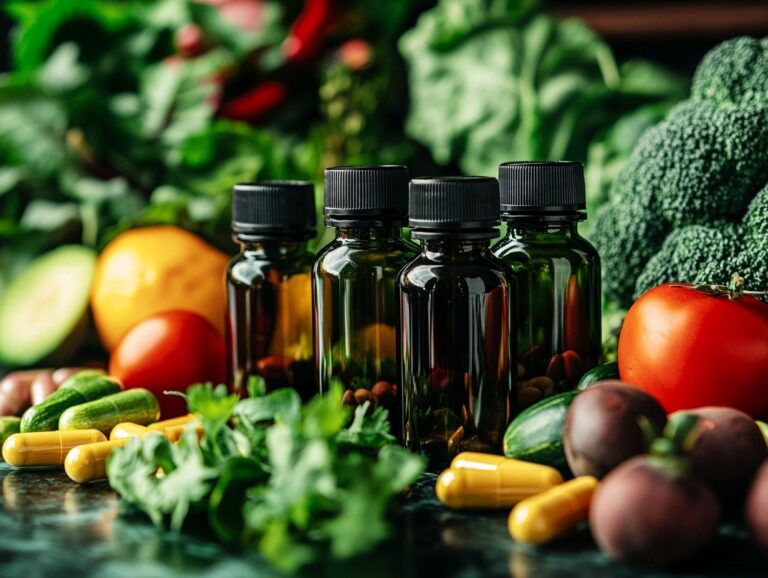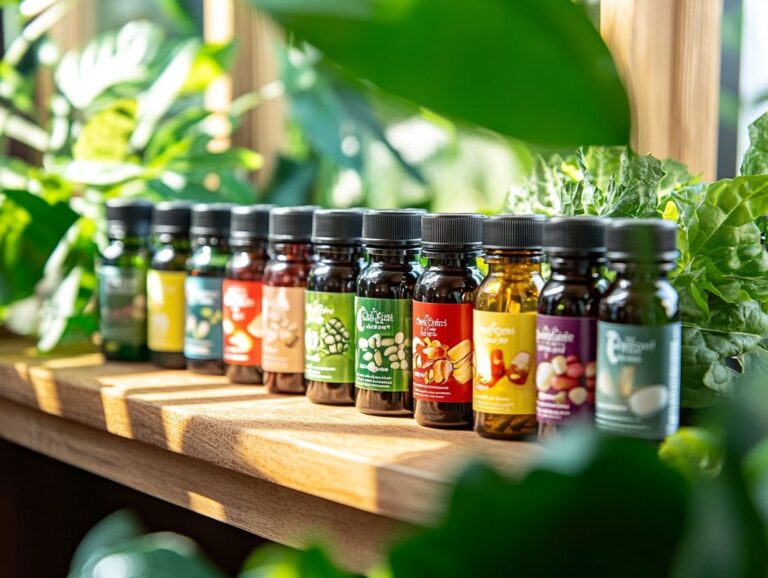Understanding plant-based vitamins is essential for achieving optimal health, particularly for those following a vegan lifestyle. These vitamins, derived entirely from plants, provide crucial nutrients that support overall well-being. This article explores the significance of plant-based vitamins for vegans, examines their numerous benefits, and highlights rich food sources. Additionally, you will find practical tips to ensure you receive adequate vitamins in your diet. Join us as we unlock the power of nature’s finest nutrients!
What Are Plant-Based Vitamins?

Plant-based vitamins are natural nutrients that offer significant benefits for human health. These essential nutrients are particularly important in vegan diets and encompass a wide range of vitamins and minerals, including vitamin B12, vitamin D3, calcium, iron, and omega-3 fatty acids, which are typically lacking in non-vegan diets.
Plant-based vitamins contribute to improved overall health and well-being, enhancing energy levels, immune function, cognitive health, and emotional well-being. Well-known brands, such as Nature Made, provide vegan vitamins to help address dietary deficiencies.
Why Are Plant-Based Vitamins Important for Vegans?
Plant-based vitamins are essential for vegans to maintain their health and well-being, as they help to fill the nutritional gaps that can arise from eliminating animal products.
While a well-planned vegan diet can provide most vitamins and minerals, certain nutrients—such as vitamin B12, iron, and omega-3 fatty acids—often require supplementation or careful monitoring to ensure daily needs are met.
Adequate intake of these key nutrients is crucial for supporting immune health, cognitive function, and emotional well-being among vegans.
What Are The Benefits Of Plant-Based Vitamins?
Plant-based vitamins offer a wide range of benefits that contribute to overall health and wellness. Sourced from fruits, vegetables, and other plant-based foods, these vitamins are rich in essential nutrients that promote immune health, support digestion, enhance joint health, and improve eye health.
For instance, vitamin C, which is abundant in citrus fruits and bell peppers, plays a crucial role in boosting the immune response and protecting against infections. B vitamins, found in leafy greens and legumes, are necessary for energy metabolism and can positively influence mood, thereby enhancing cognitive function.
Additionally, omega-3 fatty acids from sources like flaxseeds and walnuts possess anti-inflammatory properties that support joint health and may alleviate discomfort associated with arthritis. Overall, these plant-based vitamins help maintain balance within the body and support its various functions.
What Are The Different Types Of Plant-Based Vitamins?
Plant-based vitamins can be categorized into several essential types, each playing a unique role in maintaining health and supporting various bodily functions.
For example, vitamin A promotes eye health, while vitamin C is renowned for its immune-boosting properties.
Vitamin D is crucial for bone health, particularly for individuals following a vegan diet. Vitamin E serves as an antioxidant, and vitamin K is vital for blood clotting and maintaining bone health.
Together, these vitamins offer a diverse array of nutrients that enhance well-being and support overall health.
1. Vitamin A
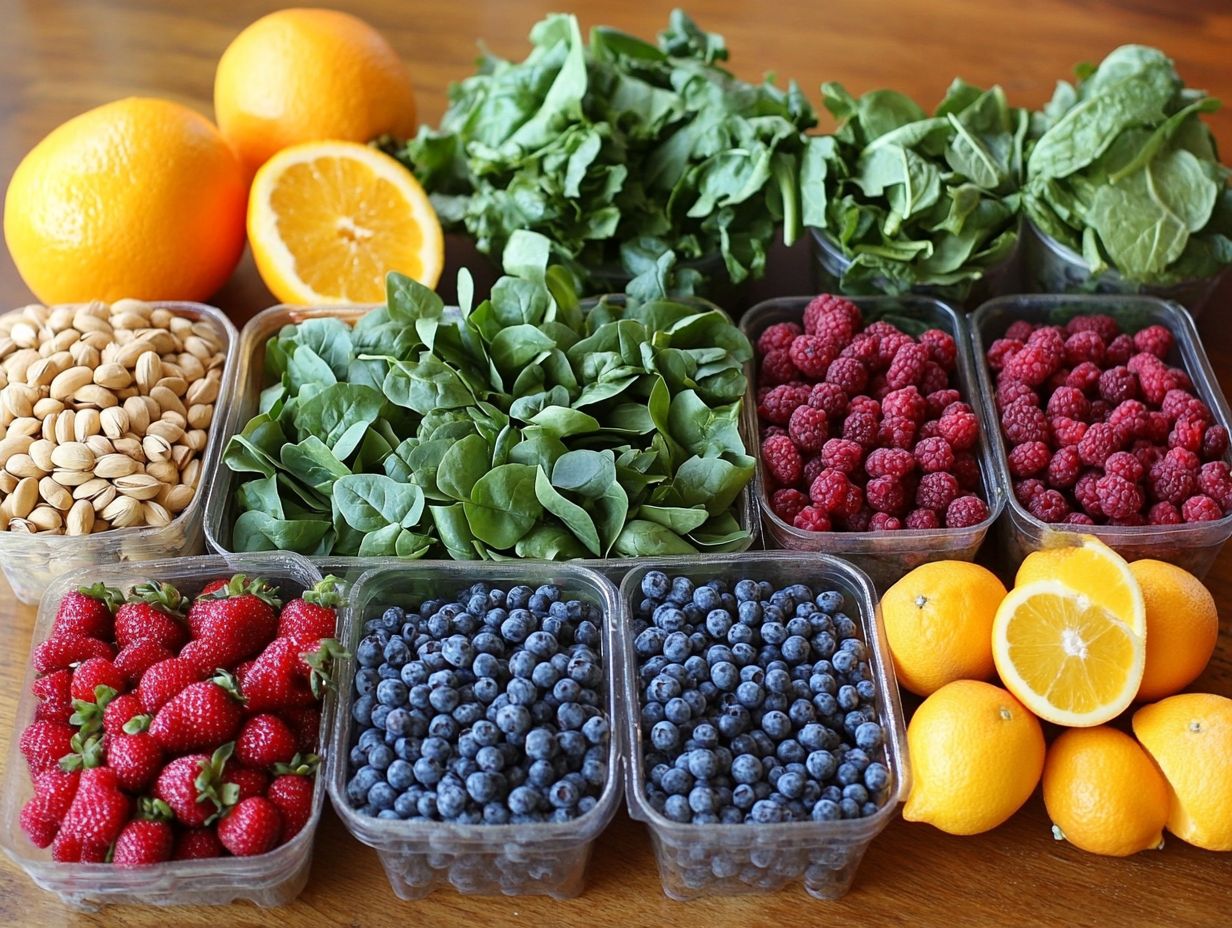
Vitamin A, a fat-soluble nutrient found in many plant-based foods, is essential for maintaining healthy vision and immune function. It plays a crucial role in promoting eye health, as it has been shown to help prevent age-related macular degeneration and other visual impairments.
Additionally, this nutrient is important for skin health, cellular growth, and reproduction. Vegan foods that are high in vitamin A include carrots, sweet potatoes, spinach, and kale, which are rich in carotenoids that the body can convert into active vitamin A.
While incorporating a variety of these foods can help ensure sufficient intake, it may be beneficial to monitor vitamin A levels, as some individuals may need to take supplements to meet their requirements, especially if they do not consume a diverse diet.
Overall, a balanced plant-based diet can effectively nourish the body and promote long-term health.
2. Vitamin C
Vitamin C is a powerful antioxidant essential for immune health and skin integrity, making it necessary in both vegan and non-vegan diets. It reduces oxidative stress and aids in the absorption of iron from plant sources, which is particularly important for vegans.
There are various vitamin C-rich foods that can enhance overall health and wellness when included in daily meals. While citrus fruits like oranges, grapefruits, and lemons are among the most recognized sources, bell peppers, strawberries, kiwi, and broccoli also provide significant amounts of this nutrient.
These foods not only support the body’s immune response but are also crucial for collagen production, which is vital for maintaining skin integrity. Regularly consuming these foods can help reduce inflammation and may accelerate recovery during illness, highlighting the unparalleled importance of vitamin C for overall health.
3. Vitamin D
Vitamin D, particularly in its D3 form, is essential for bone health and immune function; however, it can be challenging to obtain sufficient amounts from a vegan diet alone. Most individuals may need to consume fortified foods or supplements to meet their vitamin D requirements.
The benefits of vitamin D extend beyond maintaining bone health; it plays a critical role in regulating the immune system and provides protection against infections and diseases.
For those adhering to a plant-based diet, sunlight is a vital source of vitamin D, as it is synthesized by the skin in response to UV exposure. Factors such as geographic location, skin pigmentation, and lifestyle choices that limit sun exposure make dietary sources of vitamin D particularly important.
Fortified plant-based milk and UV-exposed mushrooms can contribute to vitamin D intake, but supplementation—especially with Nature Made’s vegan vitamin D3—is essential for those unable to obtain enough vitamin D from food or sunlight. This is crucial for maintaining optimal health and overall well-being.
4. Vitamin E
Vitamin E is a fat-soluble nutrient and a powerful antioxidant that protects cells from oxidative damage while supporting overall health. It is found in various plant-based foods and plays a crucial role in maintaining skin health; it may also contribute to heart health.
Vitamin E Benefits
Consuming foods rich in vitamin E offers numerous benefits. Almonds, sunflower seeds, hazelnuts, and spinach are excellent sources of vitamin E, providing healthy fats and other essential nutrients.
The antioxidant properties of vitamin E help protect the body from free radicals, which can contribute to chronic diseases and the aging process. Individuals following vegan diets can easily obtain sufficient vitamin E as long as they maintain a balanced whole food diet.
In cases where dietary sources are insufficient to ensure optimal levels of this important nutrient, vitamin E supplementation can be used to support overall well-being.
5. Vitamin K
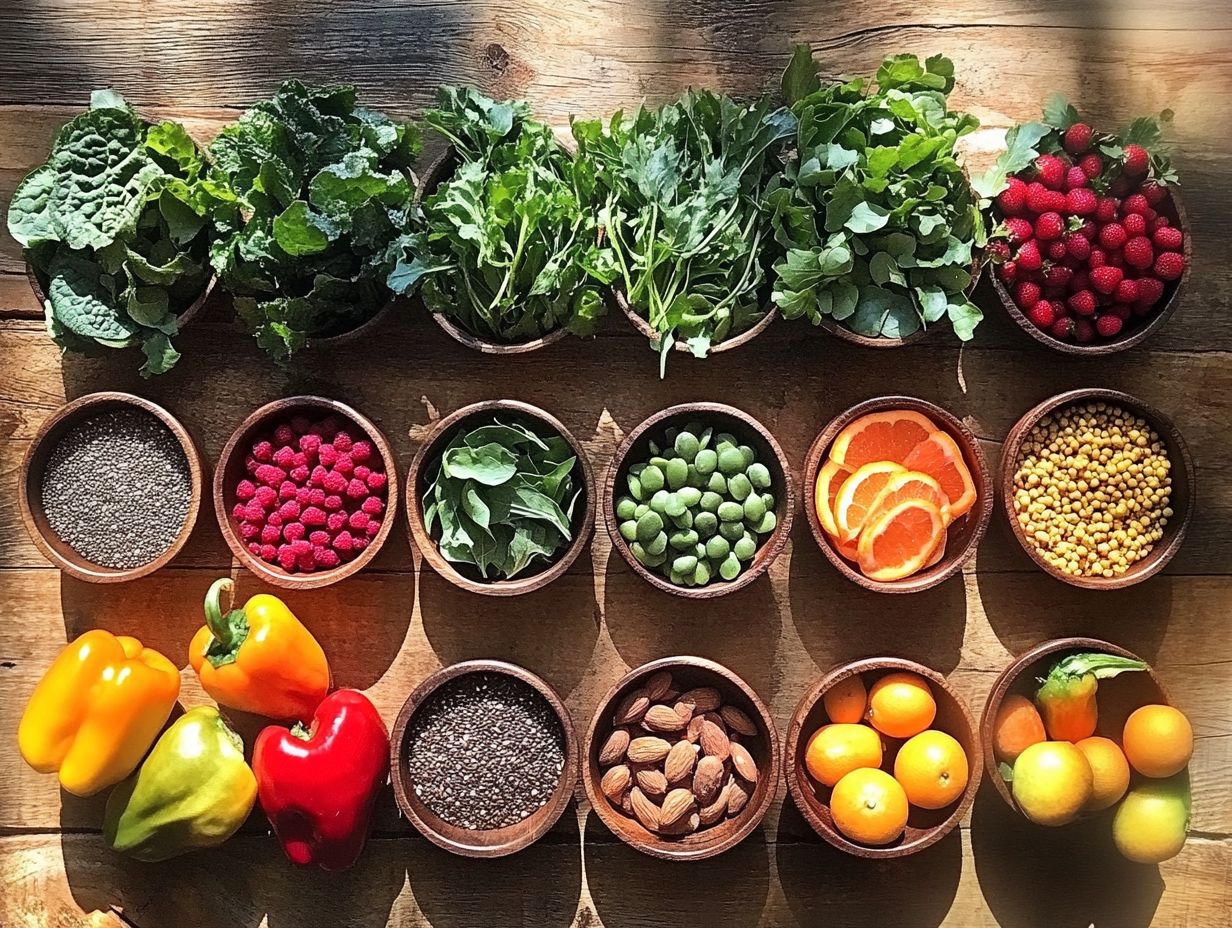
Vitamin K plays a crucial role in blood clotting and bone health, making it an essential nutrient for a balanced diet. Leafy green vegetables such as kale and spinach are excellent sources of vitamin K, which is particularly important for vegans to incorporate into their diets.
Other plant-based sources, including broccoli, Brussels sprouts, and fermented foods like natto, also contribute significantly to vitamin K intake. This vitamin is necessary for the production of proteins required for coagulation, a process that helps the body stop bleeding.
Additionally, maintaining adequate vitamin K levels supports bone density by ensuring that calcium is properly utilized in the body, thereby reducing the risk of bone fractures.
However, individuals following a vegan lifestyle may be at risk of low vitamin K consumption, which can negatively impact overall health and well-being, as a deficiency may lead to issues with cardiovascular and bone health.
Which Plant-Based Foods Are Rich In Vitamins?
The following are some of the most nutritious vitamins essential for a vegan diet, all of which can be found in plant-based foods.
Many plant-based foods are rich in a variety of vitamins that help support a vegan diet, ensuring individuals receive the necessary nutrients for optimal overall health.
Here are some of the most important vitamins present in plant-based foods.
1. Vitamin A – Carrots, Sweet Potatoes, Spinach
Vitamin A can be easily obtained from vibrant, plant-based sources such as carrots, sweet potatoes, and spinach, making it one of the vitamins that can be seamlessly integrated into a vegan diet. Carrots, along with other orange and green vegetables, are particularly high in beta-carotene, which the human body converts into active Vitamin A to support vision and immune function. Leafy greens like kale and collard greens also contain Vitamin A.
The way these vegetables are prepared significantly affects the absorption of their nutrients. For instance, cooking them with a small amount of healthy fat, like olive oil, increases the availability of beta-carotene. Additionally, blending or puréeing these vegetables into smoothies or soups can further aid in their digestion and absorption.
For those following a vegan lifestyle, it is essential to identify these sources and preparation methods to ensure an adequate intake of Vitamin A, which in turn positively impacts overall health, wellness, and bodily functions. Incorporating multivitamins can also support these needs.
2. Vitamin C – Citrus Fruits, Bell Peppers, Broccoli
Citrus fruits, bell peppers, and broccoli are among the healthiest foods rich in vitamin C, which supports immune function and skin health. Incorporating these foods into a vegan diet not only boosts vitamin C intake but also provides a diverse array of antioxidants that help reduce oxidative stress and promote wellness. Each of these vitamin C-rich foods has unique flavors and aromas, making them versatile for various culinary applications.
- Citrus fruits, such as oranges, grapefruits, lemons, and limes, are particularly popular and adaptable. They can be easily added to salads, smoothies, and desserts. For an extra zesty flavor, fresh orange segments can be tossed into salads or smoothie bowls.
- Bell peppers, especially the red and yellow varieties, are also excellent sources of vitamin C and have a sweeter taste compared to green bell peppers. They can be enjoyed sliced as a snack with hummus or included in stir-fries, making them both a healthy and delicious option.
- Broccoli is another nutritious choice that can be steamed, roasted, or blended into soups, offering a variety of tasty meals while providing its health benefits.
All of these vitamin C-rich foods can be seamlessly integrated into delicious vegan meals.
3. Vitamin D – Mushrooms, Fortified Plant Milks
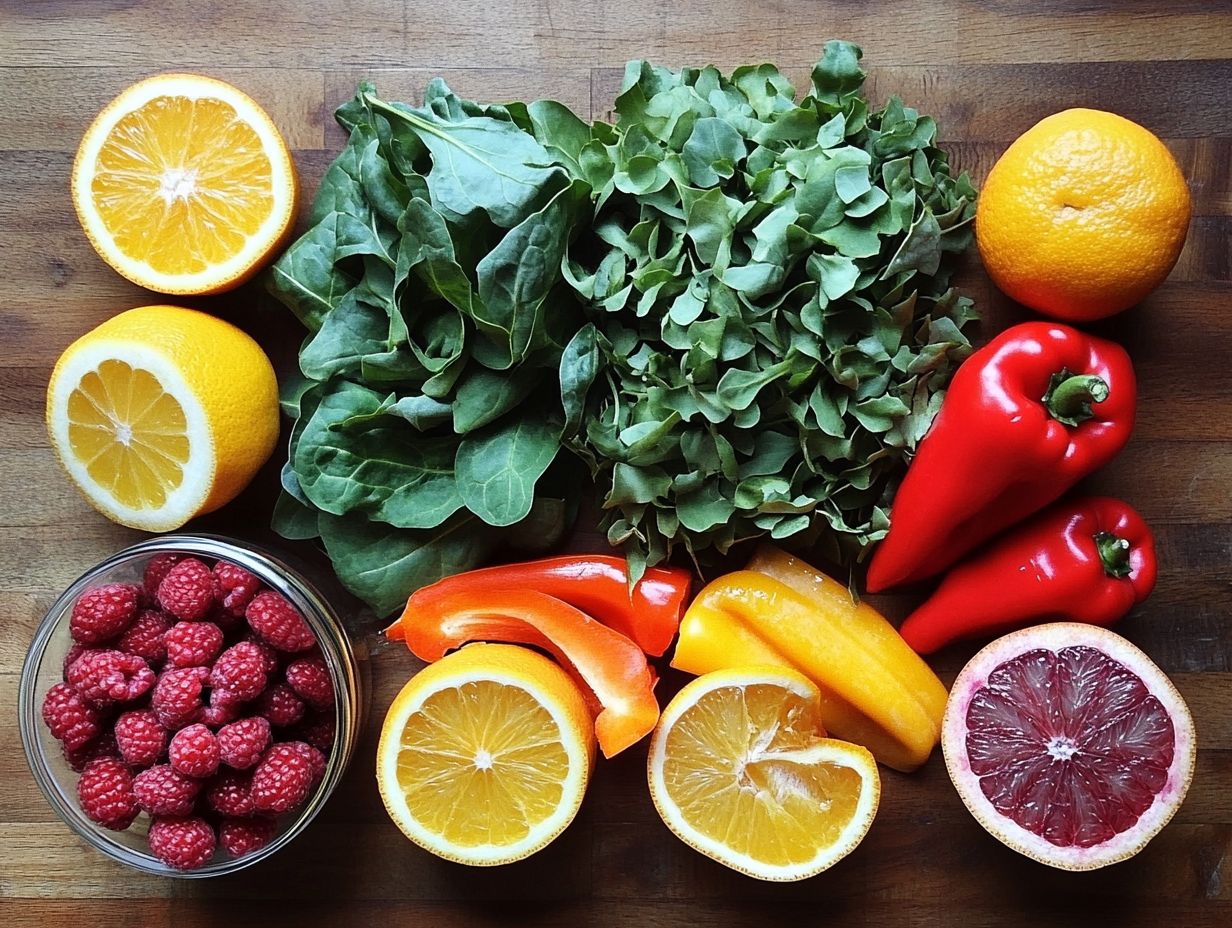
Mushrooms and fortified plant milks are among the few sources of vitamin D available to vegans, making them essential for those following a plant-based diet. Vitamin D plays a crucial role in calcium absorption and the maintenance of healthy bones and joint health, so incorporating these foods can help vegans meet their nutritional needs.
It is particularly important to learn how to include mushrooms in the diet, especially those that have been exposed to sunlight, due to the limited natural sources of this vital nutrient for individuals avoiding animal products. Fortified plant milks, such as almond, soy, and oat, often contain added vitamin D and are beneficial as part of a vegan diet.
While mushrooms and fortified milks are good sources of vitamin D, some individuals may still need to consider supplements to achieve optimal levels, particularly if they live in areas with limited natural sunlight.
When choosing supplements, it is important to ensure that they contain vitamin D2 or vitamin D3 sourced from lichen, which is suitable for vegans.
4. Vitamin E – Nuts, Seeds, Avocado
Nuts, seeds, and avocados are among the best sources of vitamin E in a vegan diet, offering essential antioxidants that help protect the body from oxidative stress and support immune health.
Incorporating these foods not only provides vitamin E but also promotes overall health, skin vitality, and cardiovascular function, contributing to better eye health and cognitive health.
The best sources of vitamin E from nuts and seeds include:
- Almonds
- Hazelnuts
- Sunflower seeds
- Pine nuts
These nutrient-rich options can easily be added to snacks and salads; for instance, adding a handful of almonds to a morning smoothie or sprinkling sunflower seeds over a fresh salad enhances both flavor and nutrition. Hazelnuts can be enjoyed as nut butter, while lightly toasted pine nuts make a delicious addition to savory pasta dishes.
Beyond their vitamin E content, these foods also contain heart-healthy fats, fiber, and other essential micronutrients, contributing to a balanced diet that can improve immune function and reduce inflammation.
5. Vitamin K – Leafy Greens, Brussels Sprouts, Broccoli
Leafy greens, Brussels sprouts, and broccoli are among the best sources of vitamin K, which is essential for blood clotting and bone health.
Including these vegetables in a healthy vegan diet ensures that individuals receive adequate amounts of vitamin K, necessary for the proper functioning of various bodily systems, including metabolism and digestion.
Vitamin K-rich vegetables like kale, spinach, and collard greens offer important nutrients and provide a wide range of health benefits, including reducing inflammation and promoting heart health.
Incorporating kale, spinach, and collard greens into smoothies, salads, and stir-fried dishes makes it easy to consume them daily. Roasting Brussels sprouts or steaming broccoli are cooking methods that preserve much of their nutritional value and can be integrated into a variety of recipes.
Regularly consuming these foods can help achieve sufficient levels of vitamin K, which plays a crucial role in bone strength and overall health.
How Can Vegans Ensure They Are Getting Enough Plant-Based Vitamins?
To ensure adequate intake of plant-based vitamins, vegans should follow a well-balanced diet that includes a wide variety of foods rich in essential nutrients.
Consuming a diverse selection of fruits, vegetables, whole grains, nuts, and seeds can help meet most vitamin requirements. Furthermore, collaborating with a registered dietitian can offer personalized recommendations on supplements and nutrient pairings to address any dietary shortfalls, ensuring optimal nutrition and emotional health.
1. Eating a variety of plant-based foods
A varied diet rich in diverse plant-based foods is essential for vegans to ensure they receive a full range of vitamins and nutrients. Incorporating a wide variety of fruits, vegetables, whole grains, legumes, nuts, and seeds can enhance a vegan diet and address potential nutritional gaps.
This approach not only helps maintain a healthy immune system and energy levels but also supports overall well-being. For instance, leafy greens such as kale and spinach are excellent sources of iron and calcium, while legumes like lentils and chickpeas provide ample protein and fiber.
Additionally, fruits like berries and oranges boost dietary vitamin C, which can enhance iron absorption and support immune health. Whole grains, such as quinoa and brown rice, offer complex carbohydrates and B vitamins.
By following a balanced and varied diet, vegans can meet their nutritional needs in appropriate amounts and promote long-term health.
2. Taking supplements
Supplements are an effective way for vegans to meet their nutritional needs for essential vitamins that may be insufficient in a vegan diet. For instance, vitamins B12 and D, as well as omega-3 fatty acids, often require supplementation, particularly for those who do not consume fortified foods.
Choosing high-quality, vegan-friendly brands can enhance the nutritional quality of a plant-based diet. Supplements provide nutrients that are commonly deficient in vegan diets but are abundant in animal products.
It is essential for individuals following a vegan lifestyle to be aware of these potential deficiencies and to select trusted brands, such as Nature Made, that are specifically designed to replace these nutrients. This approach ensures they can promote optimal health in their daily lives while achieving their goals of living a holistic and balanced vegan lifestyle.
Additional resources, such as Nutrition Buzz, BBC3, and Prima, provide expert insights into the nutrition industry, helping individuals stay informed about the latest developments and trends.
3. Consulting with a registered dietitian
Collaborating with a registered dietitian is an excellent way for vegans to maintain optimal health through nutrition.
Dietitians can assist with meal planning, recommend appropriate supplements, such as vitamin B12 and vitamin D3, and address any nutritional deficiencies that may arise from a vegan diet.



